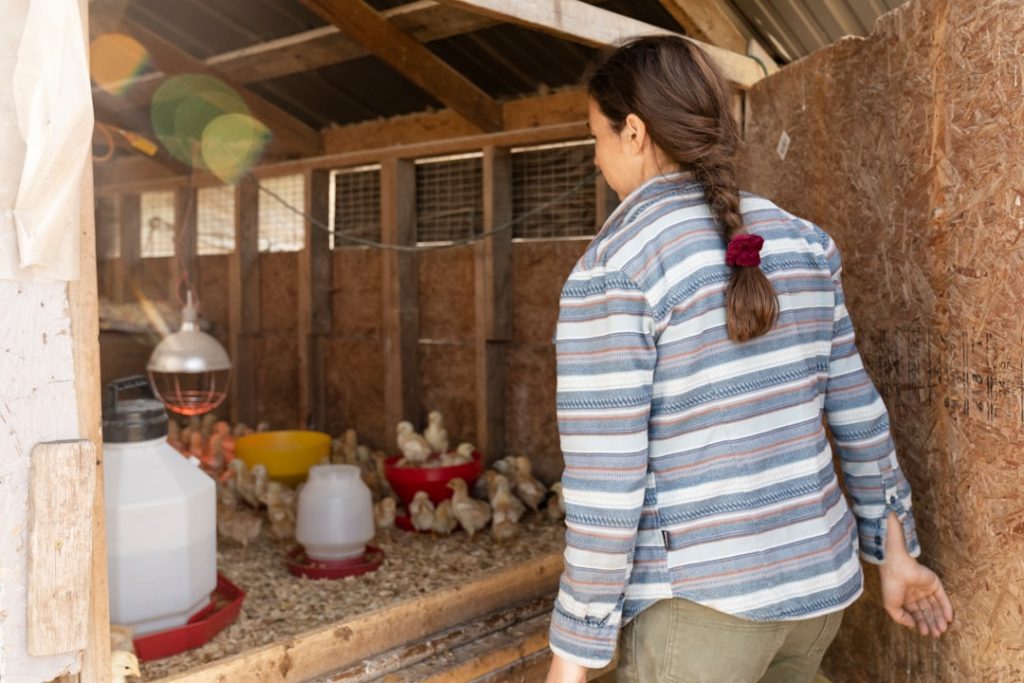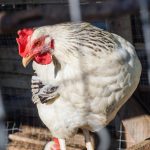Chicken health is a critical concern in agricultural operations of all sizes, from large commercial farms to small backyard coops. These birds, valued for their eggs, meat, and pest control capabilities, are susceptible to various diseases and illnesses that can significantly impact farm productivity and profitability. Common health issues include respiratory infections and parasitic infestations, which can lead to reduced egg production, diminished meat quality, and increased mortality rates among the flock.
The consequences of poor chicken health extend beyond economic considerations. Ethical concerns arise regarding animal welfare, as sick birds suffer and may experience decreased quality of life. Moreover, certain chicken-borne diseases can pose risks to human health through the consumption of contaminated eggs or meat.
Addressing chicken health issues is crucial for both small-scale and large-scale farmers. Effective management of flock health not only ensures the well-being of the birds but also contributes to the overall success and sustainability of farming operations. Implementing proper disease prevention strategies, maintaining hygienic conditions, and providing appropriate nutrition are essential steps in promoting chicken health and mitigating the risks associated with illness in poultry populations.
Table of Contents
- 1 Identifying the Cause: Understanding the Root of the Issue
- 2 Seeking Solutions: Finding Ways to Improve Chicken Health
- 3 A New Beginning: Implementing Changes for a Healthier Flock
- 4 The Role of Harvest Moon: Utilizing Natural Cycles for Better Health
- 5 Monitoring Progress: Tracking the Impact of Changes on Chicken Health
- 6 Celebrating Success: The Positive Effects of a Healthier Flock
- 7 FAQs
- 7.1 What are some common illnesses that chickens can get?
- 7.2 What are some ways to prevent chickens from getting sick?
- 7.3 What should I do if my chickens are showing signs of illness?
- 7.4 Can I use natural remedies to treat sick chickens?
- 7.5 How can I improve the overall health of my chicken flock?
Key Takeaways
- Chickens are experiencing frequent illness
- Identifying the root cause is crucial for finding solutions
- Improving chicken health requires proactive measures
- Implementing changes is necessary for a healthier flock
- Utilizing natural cycles can positively impact chicken health
- Tracking progress is essential for monitoring the impact of changes
- A healthier flock leads to positive effects and success
Identifying the Cause: Understanding the Root of the Issue
Environmental Factors
To address the problem of chickens getting sick, it’s essential to understand the root causes of their illnesses. Environmental conditions, such as overcrowding in chicken coops, can lead to stress and increased susceptibility to disease. Poor ventilation and sanitation can also create an environment that is conducive to the spread of pathogens.
Diet and Genetics
An imbalanced or inadequate diet can weaken the birds’ immune systems, making them more vulnerable to illness. Genetics also play a role in chicken health, as certain breeds may be more prone to specific health issues.
Management Practices
Management practices, such as inadequate biosecurity measures and improper handling of sick birds, can contribute to the spread of disease within a flock. By identifying these root causes, farmers can begin to develop targeted solutions to improve chicken health and prevent future outbreaks of illness.
Seeking Solutions: Finding Ways to Improve Chicken Health

Once the root causes of poor chicken health have been identified, it’s important to seek out solutions that will address these issues and promote the well-being of the birds. One approach to improving chicken health is to focus on preventative measures, such as implementing strict biosecurity protocols to minimize the risk of disease introduction and spread within the flock. This may include measures such as limiting visitor access to the farm, quarantining new birds before introducing them to the flock, and regularly disinfecting equipment and facilities.
Another important aspect of improving chicken health is ensuring that the birds receive a balanced and nutritious diet. This may involve working with a poultry nutritionist to formulate a feed ration that meets the specific nutritional needs of the flock. Providing access to clean water and ensuring that the birds have adequate space and ventilation in their living quarters are also crucial for maintaining their health.
In addition to preventative measures, it’s important for farmers to have a plan in place for managing illness when it does occur. This may involve working with a veterinarian to develop a treatment protocol for common poultry diseases and having medications on hand to address illness as soon as it is detected. By taking a proactive approach to improving chicken health, farmers can reduce the incidence of illness within their flocks and promote overall well-being among their birds.
A New Beginning: Implementing Changes for a Healthier Flock
Implementing changes for a healthier flock requires a commitment to ongoing improvement and a willingness to adapt management practices based on the specific needs of the birds. This may involve making investments in infrastructure, such as upgrading ventilation systems or expanding living quarters to reduce overcrowding. It may also involve reevaluating feeding practices and sourcing high-quality feed ingredients that meet the nutritional requirements of the birds.
In addition to physical changes, implementing changes for a healthier flock also requires a shift in mindset among farmers and farm workers. This may involve providing training on proper biosecurity measures and disease management protocols, as well as fostering a culture of vigilance when it comes to monitoring chicken health. By creating a team-based approach to poultry health, farmers can ensure that everyone involved in caring for the birds is committed to promoting their well-being.
Furthermore, implementing changes for a healthier flock may also involve seeking out alternative approaches to managing chicken health, such as incorporating natural remedies and supplements into the birds’ diet. For example, some farmers have found success in using herbal supplements or probiotics to support immune function and promote gut health among their birds. By exploring these alternative approaches, farmers can take a holistic approach to improving chicken health and well-being.
The Role of Harvest Moon: Utilizing Natural Cycles for Better Health
One approach that farmers can take to improve chicken health is to utilize natural cycles and rhythms in their management practices. For example, paying attention to the lunar cycle can provide valuable insights into optimal times for activities such as hatching eggs or administering vaccinations. The gravitational pull of the moon is believed by some to influence biological processes, and aligning management practices with lunar cycles may help optimize the health and productivity of the flock.
In addition to lunar cycles, farmers can also take advantage of natural remedies and supplements derived from plants and herbs that are known for their medicinal properties. For example, garlic has been used for centuries as a natural antibiotic and immune booster for both humans and animals. By incorporating these natural remedies into the birds’ diet, farmers can support their immune function and promote overall health without relying solely on conventional medications.
Furthermore, utilizing natural cycles for better health may also involve aligning management practices with seasonal changes in weather and daylight hours. For example, adjusting feeding schedules and lighting in chicken coops based on seasonal changes can help regulate egg production and support overall well-being among the birds. By working with nature rather than against it, farmers can create an environment that promotes optimal health and productivity for their flocks.
Monitoring Progress: Tracking the Impact of Changes on Chicken Health

Collecting Quantitative Data
Once changes have been implemented to improve chicken health, it’s essential for farmers to monitor progress and track the impact of these changes on the well-being of their flocks. This involves keeping detailed records of illness incidence, egg production rates, and overall bird vitality over time. By collecting this data, farmers can identify trends and patterns that may indicate whether their efforts to improve chicken health are having a positive impact.
Observing Qualitative Indicators
In addition to quantitative data, it’s also crucial for farmers to pay attention to qualitative indicators of chicken health, such as behavior and appearance. Healthy chickens should be active, alert, and have bright eyes and glossy feathers. By regularly observing the birds and noting any changes in their behavior or appearance, farmers can gain valuable insights into their overall well-being.
Soliciting Feedback from Farm Workers and Veterinarians
Monitoring progress may also involve seeking feedback from farm workers and veterinarians who are involved in caring for the birds. By soliciting input from those who interact with the chickens on a daily basis, farmers can gain valuable perspectives on how changes in management practices are impacting chicken health. By taking a comprehensive approach to monitoring progress, farmers can ensure that they are making informed decisions about how to best support the well-being of their flocks.
Celebrating Success: The Positive Effects of a Healthier Flock
As changes are implemented and progress is monitored, it’s important for farmers to celebrate the success of their efforts to improve chicken health. This may involve acknowledging milestones such as reduced illness incidence, increased egg production rates, or improved overall vitality among the birds. By recognizing these achievements, farmers can reinforce their commitment to ongoing improvement and inspire others in the agricultural community to prioritize animal welfare.
In addition to celebrating success within their own operations, farmers can also share their experiences and insights with others in the industry through workshops, conferences, or online forums. By sharing best practices and lessons learned from their efforts to improve chicken health, farmers can contribute to a collective effort to raise standards for poultry welfare across the agricultural sector. Furthermore, celebrating success may also involve seeking recognition through certifications or awards that acknowledge excellence in animal care and welfare.
By pursuing these accolades, farmers can demonstrate their commitment to providing a high standard of care for their flocks and inspire consumer confidence in the products they produce. In conclusion, addressing the problem of chickens getting sick requires a multifaceted approach that encompasses preventative measures, targeted interventions, and ongoing monitoring of progress. By understanding the root causes of poor chicken health and seeking out solutions that promote well-being among the birds, farmers can create an environment that supports optimal health and productivity within their flocks.
By utilizing natural cycles and remedies, monitoring progress, and celebrating success along the way, farmers can make meaningful strides toward improving chicken health and welfare within their operations.
If you’re struggling with keeping your chickens healthy, you may want to consider the type of coop you have for them. According to a related article on Poultry Wizard, the type of coop you choose can have a big impact on the health and well-being of your chickens. The article discusses the best types of coops for chickens and offers valuable tips for keeping them healthy and happy. Check it out here.
FAQs
What are some common illnesses that chickens can get?
Some common illnesses that chickens can get include respiratory infections, coccidiosis, Marek’s disease, and avian influenza.
What are some ways to prevent chickens from getting sick?
To prevent chickens from getting sick, it is important to provide them with a clean and dry living environment, a balanced diet, access to clean water, and regular veterinary care. Additionally, practicing good biosecurity measures can help prevent the spread of diseases.
What should I do if my chickens are showing signs of illness?
If your chickens are showing signs of illness, it is important to isolate the sick birds from the rest of the flock to prevent the spread of disease. You should also consult with a veterinarian who specializes in poultry to determine the cause of the illness and develop a treatment plan.
Can I use natural remedies to treat sick chickens?
While some natural remedies may help alleviate symptoms in sick chickens, it is important to consult with a veterinarian before using any alternative treatments. Natural remedies should not replace proper veterinary care and treatment.
How can I improve the overall health of my chicken flock?
To improve the overall health of your chicken flock, you should focus on providing a clean and comfortable living environment, a balanced diet, regular access to clean water, and regular veterinary care. Additionally, practicing good biosecurity measures and monitoring the flock for any signs of illness can help maintain their health.
Meet Walter, the feathered-friend fanatic of Florida! Nestled in the sunshine state, Walter struts through life with his feathered companions, clucking his way to happiness. With a coop that’s fancier than a five-star hotel, he’s the Don Juan of the chicken world. When he’s not teaching his hens to do the cha-cha, you’ll find him in a heated debate with his prized rooster, Sir Clucks-a-Lot. Walter’s poultry passion is no yolk; he’s the sunny-side-up guy you never knew you needed in your flock of friends!







